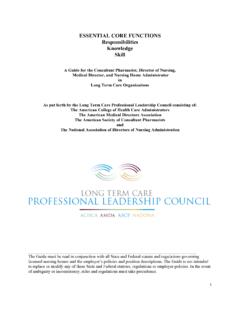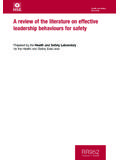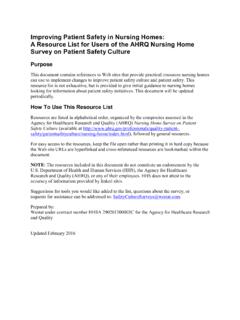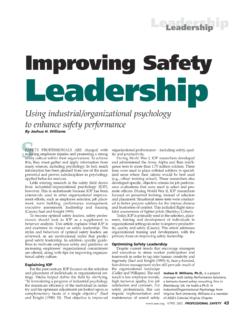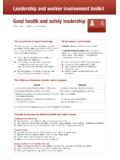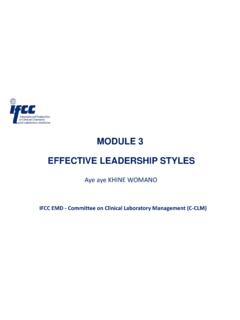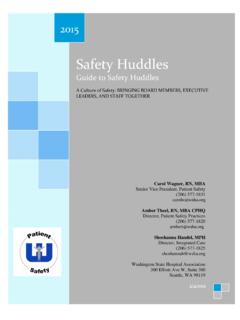Transcription of Effective Leadership in Long Term Care: The Need and the ...
1 _____ Effective Leadership in long Term Care: The Need and the Opportunity Bernie Dana, MQM, and Douglas Olson, AMERICAN COLLEGE OF HEALTH CARE ADMINISTRATORS POSITION PAPER Preface This initiative is supported by a generous grant from the Foundation of the National Association of Boards of Examiners of long Term Care Administrators _____ _____ American College of Health Care Administrators Position Paper Effective Leadership in long Term Care z Page ii Preface Under the Omnibus Budget Reconciliation Act of 1987, the nursing home administrator is responsible for management of the skilled nursing facility [42 CFR (d) (i) (ii)]. Administrators of nursing homes and a variety of other long term care settings play a central role in the quality of care and the quality of life of the people they serve.
2 Even so, the importance of their Leadership is rarely discussed or researched as a component of quality and culture transformation initiatives. The American College of Health Care Administrators (ACHCA), the professional membership association for long term care administrators, commissioned this Leadership paper to document the conceptual underpinnings for competent long term care Leadership . ACHCA s position is that the presence and perseverance of Effective Leadership is essential to the successful design, implementation, evaluation, and maintenance of quality and safety practices along with a person-centered culture transformation in the long term care setting. ACHCA, in collaboration with key long term care partners, has a primary role in the development of that Leadership . This Leadership concept paper is the result of a strategy emanating from ACHCA s 2007 Strategic Plan.
3 On behalf of the 2007 Board of Directors, Chairman of the Board Larry Slatky (CNHA, Fellow), Past Chair Lonnie Bisbano (CNHA, Fellow), and President & CEO Marianna Kern Grachek (MSN, CNHA, CALA, Fellow) provided assistance and direction for the framework of this paper. ACHCA contracted with Bernie Dana, MQM and Douglas Olson, PhD, MBA to develop this position paper. Their biographies are provided at the end of this paper. In writing this paper, The Need and the Opportunity, the authors were aware that it may be shared with a variety of audiences. Many of the people who actively manage and lead long term care organizations have little time to review the broad and the focused literature on Leadership . Educators in long term care may have a thorough understanding of Leadership research, but may not grasp the complexity of its day-to-day application.
4 Private and public policy makers need to understand the significant relationship between developing Effective Leadership and achieving and sustaining quality improvement across the profession. The breadth and depth of this paper attempts to address all of these audiences. The authors also developed a companion paper on The Role of ACHCA. This paper recommends strategies for ACHCA to develop Leadership programs and partnerships that will help create change. It will be used at the discretion of their Board of Directors as they develop initiatives to represent the important and valuable profession of health and aging services administration. Acknowledgements The authors requested feedback to an initial draft of the paper from a variety of long term care leaders. We are grateful for the insights received from Dr.
5 Robert Burke, George Washington University; Dr. Jennifer Johs-Artisensi, UW-Eau Claire; Dr. Steve Levenson, American Medical Directors Association; Mr. Randy Lindner, National Association of Boards of Examiners; and Mr. John Pratt, St. Joseph's College of Maine. Copyright 2007 by American College of Health Care Administrators. All rights reserved. _____ _____ American College of Health Care Administrators Position Paper Effective Leadership in long Term Care z Page 1 Effective Leadership in long Term Care: The Need and the Opportunity Executive Summary Consistent with its purpose and vision, the American College of Health Care Administrators (ACHCA) is exploring how it can help stimulate the changes necessary for the long term care (LTC) profession to move forward in its quest for performance excellence.
6 This position paper provides an in-depth review of the need and opportunity for Leadership development and the role that ACHCA should consider to create and provide Leadership programs that are uniquely Effective and beneficial to its members and the profession. Leadership can be viewed as both a position and a process. The one common aspect of Leadership across all views is that it involves purposeful influence of a group or organization. Attempts to distinguish the difference between a leader and a manager have created a misconception that the management process is less important than the Leadership process. High performance organizations require a balance of both Effective leaders and managers. While all organizations have leaders, not all leaders are Effective . Common ways to evaluate effectiveness are the achievement of results and the development of follower support.
7 Leaders are expected to use their status and power to help the group solve problems. When successful, leaders gain power and status. Leaders lose power and support when they don t take action or their initiatives fail because of poor judgment or incompetence. Recent studies on Leadership have focused on behaviors rather than traits. Task, relationship, and participative skills can be learned and developed into practices that make the leader more Effective . A new area of study called the neuroscience of Leadership helps us understand why knowledge alone is not enough to improve Leadership effectiveness and organizational change. The demands on LTC administration have evolved significantly since the 1960s. Administrators have traditionally focused on management processes. The hectic, unrelenting pace of work along with frequent, unplanned interactions have encouraged and rewarded a crisis management style that makes it difficult for administrators to give priority to Leadership processes.
8 The LTC focus on management is also driven by entry level licensure requirements and exams, along with the intense regulatory structure. As a result, many LTC leaders view quality and performance narrowly as achieving the minimal standards set by regulations rather than meeting and exceeding the needs and expectations of the residents/patients and their families. Studies have evolved in long term care that clearly link Effective Leadership practices with organizational performance. While these LTC studies support the broader research on Leadership , there are some nuances that make long term care Leadership unique. Among other things, these nuances can relate to the need for a compassionate perspective, the high interaction of people, the regulatory-driven environment, a predominantly non-professional work force, a flat organizational structure, the frequent change in Leadership positions, and a lack of understanding and sensitivity of governing authorities.
9 _____ _____ American College of Health Care Administrators Position Paper Effective Leadership in long Term Care z Page 2 Developing Effective LTC leaders requires the dedication of resources, identification of needs, and significantly better approaches than have been used in the past to deliver training. LTC providers, trade associations, government agencies, and educational institutions have all attempted to fill this gap. The core drivers of Leadership training, such as licensure and certification requirements, will have to be modified or supplemented. Opportunities to enter into the profession and the rewards for performance need to be expanded. LTC studies have shown that organizational performance is more closely linked to Leadership experience than to formal education. Experience translates knowledge into actions, applies problem solving techniques, and holds people accountable for performance.
10 ACHCA should incorporate these same dimensions into innovative programs for advanced Leadership development. The need for Effective leaders in long term care is real. The opportunity for ACHCA to focus energies and establish its position as the premier provider of Leadership development in the health and aging services field is significant. The effort required to achieve this goal is daunting. Even so, the goal can be realized if appropriate resources are gathered and the right partnerships are forged to create a program that makes the administrator more marketable and adds value to the organization that he or she serves. _____ _____ American College of Health Care Administrators Position Paper Effective Leadership in long Term Care z Page 3 Effective Leadership in long Term Care: The Need and the Opportunity Introduction The purpose of the American College of Health Care Administrators (ACHCA) is to promote excellence in Leadership among long term care (LTC) administrators.
